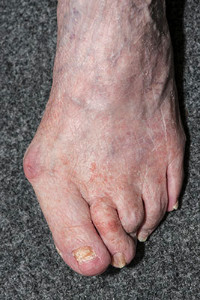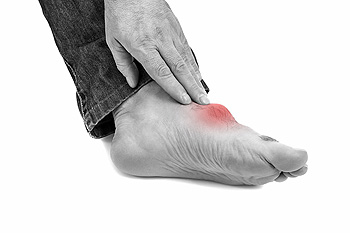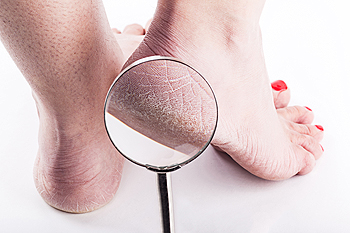
Blog (869)
High Heels and Foot Conditions
 There are a variety of shoes that can be worn that are designed to make the legs and feet appear slender and lean. One of these types of shoes are high heels, which are popular among many women. When high heels are frequently worn, the shape of the toes and toenails may change, and foot conditions, that may include bunions and blisters, may gradually develop. Additionally, the heel may be impacted, and wearing high heels for the majority of the day may lead to heel spurs or plantar fasciitis. Research has indicated that the Achilles tendon may become shorter when these types of shoes are worn, and this may cause difficulty in pointing and flexing the foot. If you would like more information about what the effect high heels may have on the feet, please consult with a podiatrist.
There are a variety of shoes that can be worn that are designed to make the legs and feet appear slender and lean. One of these types of shoes are high heels, which are popular among many women. When high heels are frequently worn, the shape of the toes and toenails may change, and foot conditions, that may include bunions and blisters, may gradually develop. Additionally, the heel may be impacted, and wearing high heels for the majority of the day may lead to heel spurs or plantar fasciitis. Research has indicated that the Achilles tendon may become shorter when these types of shoes are worn, and this may cause difficulty in pointing and flexing the foot. If you would like more information about what the effect high heels may have on the feet, please consult with a podiatrist.
High heels have a history of causing foot and ankle problems. If you have any concerns about your feet or ankles, contact one of our podiatrists from Westland Foot & Ankle Specialists, P.C.. Our doctors can provide the care you need to keep you pain-free and on your feet.
Effects of High Heels on the Feet
High heels are popular shoes among women because of their many styles and societal appeal. Despite this, high heels can still cause many health problems if worn too frequently.
Which Parts of My Body Will Be Affected by High Heels?
- Ankle Joints
- Achilles Tendon – May shorten and stiffen with prolonged wear
- Balls of the Feet
- Knees – Heels cause the knees to bend constantly, creating stress on them
- Back – They decrease the spine’s ability to absorb shock, which may lead to back pain. The vertebrae of the lower back may compress.
What Kinds of Foot Problems Can Develop from Wearing High Heels?
- Corns
- Calluses
- Hammertoe
- Bunions
- Morton’s Neuroma
- Plantar Fasciitis
How Can I Still Wear High Heels and Maintain Foot Health?
If you want to wear high heeled shoes, make sure that you are not wearing them every day, as this will help prevent long term physical problems. Try wearing thicker heels as opposed to stilettos to distribute weight more evenly across the feet. Always make sure you are wearing the proper shoes for the right occasion, such as sneakers for exercising. If you walk to work, try carrying your heels with you and changing into them once you arrive at work. Adding inserts to your heels can help cushion your feet and absorb shock. Full foot inserts or metatarsal pads are available.
If you have any questions please feel free to contact our office located in Westland, MI. . We offer the newest diagnostic and treatment technologies for all your foot and ankle needs.
Possible Treatment for Bunions
 Patients who have bunions are generally aware of the pain and discomfort they may cause while wearing shoes. It is defined as a small bony growth that gradually forms on the side of the big toe, and can come from wearing shoes that do not have adequate room for the toes to move freely in. Additionally, genetic factors may play a significant role in the development of a bunion. There are noticeable symptoms that are often associated with bunions. These can include calluses that can develop on top of the bunion, and the big toe may point toward the other toes. Relief may be found when larger shoes are worn that can accommodate the protruding bone, in addition to wearing a pad over the affected area. In severe cases, surgery may be an option to consider for permanent removal. If you have developed a bunion, please consult with a podiatrist who can properly diagnose this condition and determine what the best treatment is for you.
Patients who have bunions are generally aware of the pain and discomfort they may cause while wearing shoes. It is defined as a small bony growth that gradually forms on the side of the big toe, and can come from wearing shoes that do not have adequate room for the toes to move freely in. Additionally, genetic factors may play a significant role in the development of a bunion. There are noticeable symptoms that are often associated with bunions. These can include calluses that can develop on top of the bunion, and the big toe may point toward the other toes. Relief may be found when larger shoes are worn that can accommodate the protruding bone, in addition to wearing a pad over the affected area. In severe cases, surgery may be an option to consider for permanent removal. If you have developed a bunion, please consult with a podiatrist who can properly diagnose this condition and determine what the best treatment is for you.
If you are suffering from bunions, contact one of our podiatrists of Dr. Kane & Associates, P.C. Our doctors can provide the care you need to keep you pain-free and on your feet.
What Is a Bunion?
A bunion is formed of swollen tissue or an enlargement of boney growth, usually located at the base joint of the toe that connects to the foot. The swelling occurs due to the bones in the big toe shifting inward, which impacts the other toes of the foot. This causes the area around the base of the big toe to become inflamed and painful.
Why Do Bunions Form?
Genetics – Susceptibility to bunions are often hereditary
Stress on the feet – Poorly fitted and uncomfortable footwear that places stress on feet, such as heels, can worsen existing bunions
How Are Bunions Diagnosed?
Doctors often perform two tests – blood tests and x-rays – when trying to diagnose bunions, especially in the early stages of development. Blood tests help determine if the foot pain is being caused by something else, such as arthritis, while x-rays provide a clear picture of your bone structure to your doctor.
How Are Bunions Treated?
- Refrain from wearing heels or similar shoes that cause discomfort
- Select wider shoes that can provide more comfort and reduce pain
- Anti-inflammatory and pain management drugs
- Orthotics or foot inserts
- Surgery
If you have any questions, please feel free to contact our office located in Westland, MI.. We offer the newest diagnostic and treatment technologies for all your foot care needs.
Read more about BunionsPossible Treatment for Bunions
 Patients who have bunions are generally aware of the pain and discomfort they may cause while wearing shoes. It is defined as a small bony growth that gradually forms on the side of the big toe, and can come from wearing shoes that do not have adequate room for the toes to move freely in. Additionally, genetic factors may play a significant role in the development of a bunion. There are noticeable symptoms that are often associated with bunions. These can include calluses that can develop on top of the bunion, and the big toe may point toward the other toes. Relief may be found when larger shoes are worn that can accommodate the protruding bone, in addition to wearing a pad over the affected area. In severe cases, surgery may be an option to consider for permanent removal. If you have developed a bunion, please consult with a podiatrist who can properly diagnose this condition and determine what the best treatment is for you.
Patients who have bunions are generally aware of the pain and discomfort they may cause while wearing shoes. It is defined as a small bony growth that gradually forms on the side of the big toe, and can come from wearing shoes that do not have adequate room for the toes to move freely in. Additionally, genetic factors may play a significant role in the development of a bunion. There are noticeable symptoms that are often associated with bunions. These can include calluses that can develop on top of the bunion, and the big toe may point toward the other toes. Relief may be found when larger shoes are worn that can accommodate the protruding bone, in addition to wearing a pad over the affected area. In severe cases, surgery may be an option to consider for permanent removal. If you have developed a bunion, please consult with a podiatrist who can properly diagnose this condition and determine what the best treatment is for you.
If you are suffering from bunions, contact one of our podiatrists of Westland Foot & Ankle Specialists, P.C.. Our doctors can provide the care you need to keep you pain-free and on your feet.
What Is a Bunion?
A bunion is formed of swollen tissue or an enlargement of boney growth, usually located at the base joint of the toe that connects to the foot. The swelling occurs due to the bones in the big toe shifting inward, which impacts the other toes of the foot. This causes the area around the base of the big toe to become inflamed and painful.
Why Do Bunions Form?
Genetics – Susceptibility to bunions are often hereditary
Stress on the feet – Poorly fitted and uncomfortable footwear that places stress on feet, such as heels, can worsen existing bunions
How Are Bunions Diagnosed?
Doctors often perform two tests – blood tests and x-rays – when trying to diagnose bunions, especially in the early stages of development. Blood tests help determine if the foot pain is being caused by something else, such as arthritis, while x-rays provide a clear picture of your bone structure to your doctor.
How Are Bunions Treated?
- Refrain from wearing heels or similar shoes that cause discomfort
- Select wider shoes that can provide more comfort and reduce pain
- Anti-inflammatory and pain management drugs
- Orthotics or foot inserts
- Surgery
If you have any questions, please feel free to contact our office located in Westland, MI. . We offer the newest diagnostic and treatment technologies for all your foot care needs.
What is Gout?
 A large amount of uric acid in the body may lead to a condition that is commonly known as gout. This ailment often produces severe pain and discomfort, and typically affects the big toe. Patients who are afflicted with gout may notice the pain is so debilitating, it may cause an inability to walk. Additional symptoms may include redness, swelling, and some patients may have a fever. Gout is caused by factors that can include family history, and from eating foods that have elevated purine levels. This can lead to a build-up of uric acid, which may cause sharp pains between the joints in the big toe. These types of foods can consist of shellfish, red meat, and drinks that have a high sugar content. Mild relief may be found when the affected foot is elevated, and this may help to diminish a portion of the swelling as well. If you have developed gout, it is strongly advised that you consult with a podiatrist who can help you to find comfort, and suggest methods to possibly prevent this ailment from occurring in the future.
A large amount of uric acid in the body may lead to a condition that is commonly known as gout. This ailment often produces severe pain and discomfort, and typically affects the big toe. Patients who are afflicted with gout may notice the pain is so debilitating, it may cause an inability to walk. Additional symptoms may include redness, swelling, and some patients may have a fever. Gout is caused by factors that can include family history, and from eating foods that have elevated purine levels. This can lead to a build-up of uric acid, which may cause sharp pains between the joints in the big toe. These types of foods can consist of shellfish, red meat, and drinks that have a high sugar content. Mild relief may be found when the affected foot is elevated, and this may help to diminish a portion of the swelling as well. If you have developed gout, it is strongly advised that you consult with a podiatrist who can help you to find comfort, and suggest methods to possibly prevent this ailment from occurring in the future.
Gout is a foot condition that requires certain treatment and care. If you are seeking treatment, contact one of our podiatrists from Dr. Kane & Associates, P.C. Our doctors will treat your foot and ankle needs.
What Is Gout?
Gout is a type of arthritis caused by a buildup of uric acid in the bloodstream. It often develops in the foot, especially the big toe area, although it can manifest in other parts of the body as well. Gout can make walking and standing very painful and is especially common in diabetics and the obese.
People typically get gout because of a poor diet. Genetic predisposition is also a factor. The children of parents who have had gout frequently have a chance of developing it themselves.
Gout can easily be identified by redness and inflammation of the big toe and the surrounding areas of the foot. Other symptoms include extreme fatigue, joint pain, and running high fevers. Sometimes corticosteroid drugs can be prescribed to treat gout, but the best way to combat this disease is to get more exercise and eat a better diet.
If you have any questions please feel free to contact our office located in Westland, MI.. We offer the newest diagnostic and treatment technologies for all your foot and ankle needs.
Read more about GoutWhat is Gout?
 A large amount of uric acid in the body may lead to a condition that is commonly known as gout. This ailment often produces severe pain and discomfort, and typically affects the big toe. Patients who are afflicted with gout may notice the pain is so debilitating, it may cause an inability to walk. Additional symptoms may include redness, swelling, and some patients may have a fever. Gout is caused by factors that can include family history, and from eating foods that have elevated purine levels. This can lead to a build-up of uric acid, which may cause sharp pains between the joints in the big toe. These types of foods can consist of shellfish, red meat, and drinks that have a high sugar content. Mild relief may be found when the affected foot is elevated, and this may help to diminish a portion of the swelling as well. If you have developed gout, it is strongly advised that you consult with a podiatrist who can help you to find comfort, and suggest methods to possibly prevent this ailment from occurring in the future.
A large amount of uric acid in the body may lead to a condition that is commonly known as gout. This ailment often produces severe pain and discomfort, and typically affects the big toe. Patients who are afflicted with gout may notice the pain is so debilitating, it may cause an inability to walk. Additional symptoms may include redness, swelling, and some patients may have a fever. Gout is caused by factors that can include family history, and from eating foods that have elevated purine levels. This can lead to a build-up of uric acid, which may cause sharp pains between the joints in the big toe. These types of foods can consist of shellfish, red meat, and drinks that have a high sugar content. Mild relief may be found when the affected foot is elevated, and this may help to diminish a portion of the swelling as well. If you have developed gout, it is strongly advised that you consult with a podiatrist who can help you to find comfort, and suggest methods to possibly prevent this ailment from occurring in the future.
Gout is a foot condition that requires certain treatment and care. If you are seeking treatment, contact one of our podiatrists from Westland Foot & Ankle Specialists, P.C.. Our doctors will treat your foot and ankle needs.
What Is Gout?
Gout is a type of arthritis caused by a buildup of uric acid in the bloodstream. It often develops in the foot, especially the big toe area, although it can manifest in other parts of the body as well. Gout can make walking and standing very painful and is especially common in diabetics and the obese.
People typically get gout because of a poor diet. Genetic predisposition is also a factor. The children of parents who have had gout frequently have a chance of developing it themselves.
Gout can easily be identified by redness and inflammation of the big toe and the surrounding areas of the foot. Other symptoms include extreme fatigue, joint pain, and running high fevers. Sometimes corticosteroid drugs can be prescribed to treat gout, but the best way to combat this disease is to get more exercise and eat a better diet.
If you have any questions please feel free to contact our office located in Westland, MI. . We offer the newest diagnostic and treatment technologies for all your foot and ankle needs.
Plantar Warts Can Be Treated!
Plantar Warts Can Be Treated!
Common Symptoms of Cracked Heels
 Cracked heels, if left untreated, can be an incredibly uncomfortable condition to deal with. If the cracks or fissures of the heel become deep enough, those affected may experience pain while standing, walking, or when putting any amount of pressure on the heels. Those who are obese, stand for long periods of time, or frequently wear open back shoes, may be more susceptible to developing cracked heels. Some of the first symptoms you may notice with this condition can include a hardening or thickening of the skin on the heels. In some cases, corns or calluses may form on the heel as well. In more severe cases, the heels may become discolored or begin bleeding, which is often indicative that an infection has formed. For more information, or to best treat cracked heels, it is suggested that you consult with a podiatrist for professional care.
Cracked heels, if left untreated, can be an incredibly uncomfortable condition to deal with. If the cracks or fissures of the heel become deep enough, those affected may experience pain while standing, walking, or when putting any amount of pressure on the heels. Those who are obese, stand for long periods of time, or frequently wear open back shoes, may be more susceptible to developing cracked heels. Some of the first symptoms you may notice with this condition can include a hardening or thickening of the skin on the heels. In some cases, corns or calluses may form on the heel as well. In more severe cases, the heels may become discolored or begin bleeding, which is often indicative that an infection has formed. For more information, or to best treat cracked heels, it is suggested that you consult with a podiatrist for professional care.
If the skin on your feet starts to crack, you may want to see a podiatrist to find treatment. If you have any concerns, contact one of our podiatrists from Dr. Kane & Associates, P.C. Our doctors can provide the care you need to keep you pain-free and on your feet.
Cracked Heels
It is important to moisturize your cracked heels in order to prevent pain, bleeding, and infection. The reason cracked heels form is because the skin on the foot is too dry to support the immense pressure placed on them. When the foot expands, the dry skin on the foot begins to split.
Ways to Help Heal Them
- Invest in a good foot cream
- Try Using Petroleum Jelly
- Ease up on Soaps
- Drink Plenty of Water
Ways to Prevent Cracked Heels
- Moisturize After Showering
- Skip a Shower
- Keep Shower Water Lukewarm
- Don’t Scrub Your Feet
If you are unsure how to proceed in treating cracked heels, seek guidance from a podiatrist. Your doctor will help you with any questions or information you may need.
If you have any questions, please feel free to contact our office located in Westland, MI.. We offer the newest diagnostic and treatment technologies for all your foot care needs.
Read more about Solutions for Cracked HeelsCommon Symptoms of Cracked Heels
 Cracked heels, if left untreated, can be an incredibly uncomfortable condition to deal with. If the cracks or fissures of the heel become deep enough, those affected may experience pain while standing, walking, or when putting any amount of pressure on the heels. Those who are obese, stand for long periods of time, or frequently wear open back shoes, may be more susceptible to developing cracked heels. Some of the first symptoms you may notice with this condition can include a hardening or thickening of the skin on the heels. In some cases, corns or calluses may form on the heel as well. In more severe cases, the heels may become discolored or begin bleeding, which is often indicative that an infection has formed. For more information, or to best treat cracked heels, it is suggested that you consult with a podiatrist for professional care.
Cracked heels, if left untreated, can be an incredibly uncomfortable condition to deal with. If the cracks or fissures of the heel become deep enough, those affected may experience pain while standing, walking, or when putting any amount of pressure on the heels. Those who are obese, stand for long periods of time, or frequently wear open back shoes, may be more susceptible to developing cracked heels. Some of the first symptoms you may notice with this condition can include a hardening or thickening of the skin on the heels. In some cases, corns or calluses may form on the heel as well. In more severe cases, the heels may become discolored or begin bleeding, which is often indicative that an infection has formed. For more information, or to best treat cracked heels, it is suggested that you consult with a podiatrist for professional care.
If the skin on your feet starts to crack, you may want to see a podiatrist to find treatment. If you have any concerns, contact one of our podiatrists from Westland Foot & Ankle Specialists, P.C.. Our doctors can provide the care you need to keep you pain-free and on your feet.
Cracked Heels
It is important to moisturize your cracked heels in order to prevent pain, bleeding, and infection. The reason cracked heels form is because the skin on the foot is too dry to support the immense pressure placed on them. When the foot expands, the dry skin on the foot begins to split.
Ways to Help Heal Them
- Invest in a good foot cream
- Try Using Petroleum Jelly
- Ease up on Soaps
- Drink Plenty of Water
Ways to Prevent Cracked Heels
- Moisturize After Showering
- Skip a Shower
- Keep Shower Water Lukewarm
- Don’t Scrub Your Feet
If you are unsure how to proceed in treating cracked heels, seek guidance from a podiatrist. Your doctor will help you with any questions or information you may need.
If you have any questions, please feel free to contact our office located in Westland, MI. . We offer the newest diagnostic and treatment technologies for all your foot care needs.
Why Do Blisters Form?
 A blister generally forms as a result of excess friction. When a blister develops on the feet, walking, running, and performing daily activities may be difficult to accomplish. Blisters are considered to be common among those who enjoy sports and hiking. They are defined as a pocket of fluid that forms over the affected portion of skin, which is the body’s natural method of protecting the damaged skin. When new skin has formed, the blister will gradually drain. There are methods that can be implemented which may help to prevent blisters. These may include wearing shoes that fit correctly, and wearing socks that are made of breathable materials. Additionally, it may help to wear cushioned insoles that can provide extra comfort. If you are afflicted with blisters on the feet, it is advised that you speak with a podiatrist who can properly treat this condition.
A blister generally forms as a result of excess friction. When a blister develops on the feet, walking, running, and performing daily activities may be difficult to accomplish. Blisters are considered to be common among those who enjoy sports and hiking. They are defined as a pocket of fluid that forms over the affected portion of skin, which is the body’s natural method of protecting the damaged skin. When new skin has formed, the blister will gradually drain. There are methods that can be implemented which may help to prevent blisters. These may include wearing shoes that fit correctly, and wearing socks that are made of breathable materials. Additionally, it may help to wear cushioned insoles that can provide extra comfort. If you are afflicted with blisters on the feet, it is advised that you speak with a podiatrist who can properly treat this condition.
Blisters are prone to making everyday activities extremely uncomfortable. If your feet are hurting, contact one of our podiatrists of Dr. Kane & Associates, P.C. Our doctors can provide the care you need to keep you pain-free and on your feet.
Foot Blisters
Foot blisters develop as a result of constantly wearing tight or ill-fitting footwear. This happens due to the constant rubbing from the shoe, which can often lead to pain.
What Are Foot Blisters?
A foot blister is a small fluid-filled pocket that forms on the upper-most layer of the skin. Blisters are filled with clear fluid and can lead to blood drainage or pus if the area becomes infected.
How Do Blisters Form?
Blisters on the feet are often the result of constant friction of skin and material, usually by shoe rubbing. Walking in sandals, boots, or shoes that don’t fit properly for long periods of time can result in a blister. Having consistent foot moisture and humidity can easily lead to blister formation.
Prevention & Treatment
It is important to properly care for the affected area in order to prevent infection and ease the pain. Do not lance the blister and use a Band-Aid to provide pain relief. Also, be sure to keep your feet dry and wear proper fitting shoes. If you see blood or pus in a blister, seek assistance from a podiatrist.
If you have any questions, please feel free to contact our office located in Westland, MI.. We offer the newest diagnostic and treatment technologies for all your foot care needs.
Read more about Blisters on the FeetMore...
Why Do Blisters Form?
 A blister generally forms as a result of excess friction. When a blister develops on the feet, walking, running, and performing daily activities may be difficult to accomplish. Blisters are considered to be common among those who enjoy sports and hiking. They are defined as a pocket of fluid that forms over the affected portion of skin, which is the body’s natural method of protecting the damaged skin. When new skin has formed, the blister will gradually drain. There are methods that can be implemented which may help to prevent blisters. These may include wearing shoes that fit correctly, and wearing socks that are made of breathable materials. Additionally, it may help to wear cushioned insoles that can provide extra comfort. If you are afflicted with blisters on the feet, it is advised that you speak with a podiatrist who can properly treat this condition.
A blister generally forms as a result of excess friction. When a blister develops on the feet, walking, running, and performing daily activities may be difficult to accomplish. Blisters are considered to be common among those who enjoy sports and hiking. They are defined as a pocket of fluid that forms over the affected portion of skin, which is the body’s natural method of protecting the damaged skin. When new skin has formed, the blister will gradually drain. There are methods that can be implemented which may help to prevent blisters. These may include wearing shoes that fit correctly, and wearing socks that are made of breathable materials. Additionally, it may help to wear cushioned insoles that can provide extra comfort. If you are afflicted with blisters on the feet, it is advised that you speak with a podiatrist who can properly treat this condition.
Blisters are prone to making everyday activities extremely uncomfortable. If your feet are hurting, contact one of our podiatrists of Westland Foot & Ankle Specialists, P.C.. Our doctors can provide the care you need to keep you pain-free and on your feet.
Foot Blisters
Foot blisters develop as a result of constantly wearing tight or ill-fitting footwear. This happens due to the constant rubbing from the shoe, which can often lead to pain.
What Are Foot Blisters?
A foot blister is a small fluid-filled pocket that forms on the upper-most layer of the skin. Blisters are filled with clear fluid and can lead to blood drainage or pus if the area becomes infected.
How Do Blisters Form?
Blisters on the feet are often the result of constant friction of skin and material, usually by shoe rubbing. Walking in sandals, boots, or shoes that don’t fit properly for long periods of time can result in a blister. Having consistent foot moisture and humidity can easily lead to blister formation.
Prevention & Treatment
It is important to properly care for the affected area in order to prevent infection and ease the pain. Do not lance the blister and use a Band-Aid to provide pain relief. Also, be sure to keep your feet dry and wear proper fitting shoes. If you see blood or pus in a blister, seek assistance from a podiatrist.
If you have any questions, please feel free to contact our office located in Westland, MI. . We offer the newest diagnostic and treatment technologies for all your foot care needs.
Chair Yoga May Help to Stretch the Feet
 A form of stretching, which is referred to as chair yoga, may be beneficial to practice after sitting and standing for extended periods of time. It can be helpful to stretch the feet in a classroom environment, which can be accomplished by a variety of methods. Heel raises are performed while keeping both heels flat on the floor, and lifting one heel at a time. After holding this position for a few seconds, repeat with the other foot. When the toes and feet are flexible, it may lead to easing tension in the shoulders and neck. This can be a result of utilizing the reflex zones that are located in the feet, and is accomplished by clenching the toes and soles of the feet, and then relaxing them. If you would like additional information about the benefits of stretching the feet, it is suggested that you speak to a podiatrist.
A form of stretching, which is referred to as chair yoga, may be beneficial to practice after sitting and standing for extended periods of time. It can be helpful to stretch the feet in a classroom environment, which can be accomplished by a variety of methods. Heel raises are performed while keeping both heels flat on the floor, and lifting one heel at a time. After holding this position for a few seconds, repeat with the other foot. When the toes and feet are flexible, it may lead to easing tension in the shoulders and neck. This can be a result of utilizing the reflex zones that are located in the feet, and is accomplished by clenching the toes and soles of the feet, and then relaxing them. If you would like additional information about the benefits of stretching the feet, it is suggested that you speak to a podiatrist.
Stretching the feet is a great way to prevent injuries. If you have any concerns with your feet consult with one of our podiatrists from Dr. Kane & Associates, P.C. Our doctors will assess your condition and provide you with quality foot and ankle treatment.
Stretching the Feet
Stretching the muscles in the foot is an important part in any physical activity. Feet that are tight can lead to less flexibility and make you more prone to injury. One of the most common forms of foot pain, plantar fasciitis, can be stretched out to help ease the pain. Stretching can not only ease pain from plantar fasciitis but also prevent it as well. However, it is important to see a podiatrist first if stretching is right for you. Podiatrists can also recommend other ways to stretch your feet. Once you know whether stretching is right for you, here are some excellent stretches you can do.
- Using a foam roller or any cylindrical object (a water bottle or soda can will do), roll the object under your foot back and forth. You should also exert pressure on the object. Be sure to do this to both feet for a minute. Do this exercise three times each.
- Similar to the previous one, take a ball, such as a tennis ball, and roll it under your foot while seated and exert pressure on it.
- Grab a resistance band or towel and take a seat. If you are using a towel, fold it length wise. Next put either one between the ball of your foot and heel and pull with both hands on each side towards you. Hold this for 15 seconds and then switch feet. Do this three times for each foot.
- Finally hold your big toe while crossing one leg over the other. Pull the toe towards you and hold for 15 seconds. Once again do this three times per foot.
It is best to go easy when first stretching your foot and work your way up. If your foot starts hurting, stop exercising and ice and rest the foot. It is advised to then see a podiatrist for help.
If you have any questions, please feel free to contact our office located in Westland, MI.. We offer the newest diagnostic and treatment technologies for all your foot care needs.
Read more about How to Stretch Your FeetChair Yoga May Help to Stretch the Feet
 A form of stretching, which is referred to as chair yoga, may be beneficial to practice after sitting and standing for extended periods of time. It can be helpful to stretch the feet in a classroom environment, which can be accomplished by a variety of methods. Heel raises are performed while keeping both heels flat on the floor, and lifting one heel at a time. After holding this position for a few seconds, repeat with the other foot. When the toes and feet are flexible, it may lead to easing tension in the shoulders and neck. This can be a result of utilizing the reflex zones that are located in the feet, and is accomplished by clenching the toes and soles of the feet, and then relaxing them. If you would like additional information about the benefits of stretching the feet, it is suggested that you speak to a podiatrist.
A form of stretching, which is referred to as chair yoga, may be beneficial to practice after sitting and standing for extended periods of time. It can be helpful to stretch the feet in a classroom environment, which can be accomplished by a variety of methods. Heel raises are performed while keeping both heels flat on the floor, and lifting one heel at a time. After holding this position for a few seconds, repeat with the other foot. When the toes and feet are flexible, it may lead to easing tension in the shoulders and neck. This can be a result of utilizing the reflex zones that are located in the feet, and is accomplished by clenching the toes and soles of the feet, and then relaxing them. If you would like additional information about the benefits of stretching the feet, it is suggested that you speak to a podiatrist.
Stretching the feet is a great way to prevent injuries. If you have any concerns with your feet consult with one of our podiatrists from Westland Foot & Ankle Specialists, P.C.. Our doctors will assess your condition and provide you with quality foot and ankle treatment.
Stretching the Feet
Stretching the muscles in the foot is an important part in any physical activity. Feet that are tight can lead to less flexibility and make you more prone to injury. One of the most common forms of foot pain, plantar fasciitis, can be stretched out to help ease the pain. Stretching can not only ease pain from plantar fasciitis but also prevent it as well. However, it is important to see a podiatrist first if stretching is right for you. Podiatrists can also recommend other ways to stretch your feet. Once you know whether stretching is right for you, here are some excellent stretches you can do.
- Using a foam roller or any cylindrical object (a water bottle or soda can will do), roll the object under your foot back and forth. You should also exert pressure on the object. Be sure to do this to both feet for a minute. Do this exercise three times each.
- Similar to the previous one, take a ball, such as a tennis ball, and roll it under your foot while seated and exert pressure on it.
- Grab a resistance band or towel and take a seat. If you are using a towel, fold it length wise. Next put either one between the ball of your foot and heel and pull with both hands on each side towards you. Hold this for 15 seconds and then switch feet. Do this three times for each foot.
- Finally hold your big toe while crossing one leg over the other. Pull the toe towards you and hold for 15 seconds. Once again do this three times per foot.
It is best to go easy when first stretching your foot and work your way up. If your foot starts hurting, stop exercising and ice and rest the foot. It is advised to then see a podiatrist for help.
If you have any questions, please feel free to contact our office located in Westland, MI. . We offer the newest diagnostic and treatment technologies for all your foot care needs.



